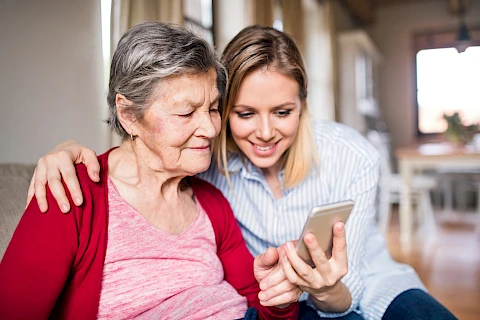
Finding out that a loved one has Alzheimer's can be overwhelming, especially when you're living far away. Alzheimer's disease affects not only the individual but the entire family. Staying connected and involved is necessary, even if you're separated by hundreds or even thousands of miles. This guide is for adult children who live far from their newly diagnosed senior parents with Alzheimer's. We provide practical steps to navigate this challenging journey.
Recognizing Alzheimer's and Its Progression
Alzheimer's disease is a progressive brain disorder that slowly affects memory, thinking skills, and ultimately the ability to carry out simple tasks. The disease progresses through stages, starting with mild memory loss and advancing to severe cognitive and physical impairments. Knowing these stages can help you anticipate the changes that will occur and prepare accordingly. Symptoms may include confusion, difficulty completing familiar tasks, and changes in behavior. Early intervention and planning allows you to manage the disease effectively and ensure the well-being of your loved one.
Initial Steps to Take
When you first learn of the diagnosis, it's critical to establish open communication with your loved one and other family members:
- Discuss the situation honestly and openly, and establish a plan that is agreeable to everyone.
- Gather as much information as possible about Alzheimer's, including potential treatments and care options.
- Establish a support network made up of family, friends, and neighbors who live near your loved one. This network can provide immediate assistance and updates, helping you stay informed and involved.
Staying Involved from a Distance
Staying involved can seem challenging from a distance, but there are ways to stay in touch. Make regular phone calls or set up weekly video chats to maintain that meaningful connection. If possible, plan regular visits to spend time with your loved one and help coordinate with local family members. Technology can be a powerful ally; use it to monitor daily routines or remind your loved one about medications and appointments.
Coordinating Care and Support
Once the initial steps are in place, it's time to look at longer-term care and support. Explore local resources and support groups in your loved one's area, as these can provide valuable assistance. Hiring professional caregivers or in-home care services also guarantees that your loved one receives the daily help they need. Remember to work on legal and financial planning, including powers of attorney and managing finances, to prepare for the future.
Emotional Support and Self-Care
As you support your loved one, it's also necessary to care for your emotional well-being. Managing stress and emotions is central to maintaining your own health. Encourage your loved one to engage in activities and hobbies that bring them joy and help stimulate their mind. Remember, seeking support for yourself is perfectly okay. Consider counseling or joining a support group to share experiences with other caregivers.
Local Support for Families Facing Alzheimer’s
Taking proactive steps can make a significant difference in managing a loved one's Alzheimer's journey. Staying informed and involved, even from a distance, ensures that your loved one receives the support they need. Don't hesitate to reach out for professional help. Contact us at Senior Helpers Roseville for expert Alzheimer's and Dementia Care services in St. Paul, Roseville, New Brighton, Shoreview, and North Oaks. By connecting with knowledgeable caregivers, you can ensure your loved one is in good hands while receiving the quality of care they deserve.